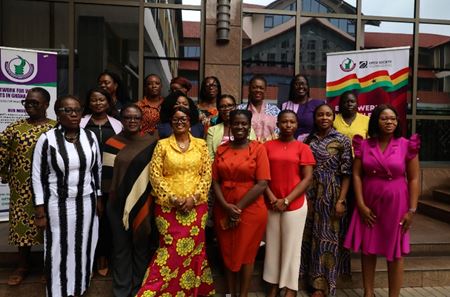By Deborah Asantewaah SARFO
The Network for Women’s Rights (NETRIGHT) intends to leverage some strategies in engaging policymakers, institutions and stakeholders in its advocacy efforts for gender-transformative social policies.
Key strategies to be considered in addressing the adverse effects of austerity measures on women were highlighted at a roundtable discussion on debt restructuring with women in the private sector. It brought together a diverse group of people including women leaders in the private sector, representatives from Civil Society Organisations and academia.
This initiative is part of NETRIGHT’s project on ‘Empowering Women for Change: Advocating for Gender Transformative Social Policies through Feminist Mobilising in Ghana’ with support from Open Society Africa.
One of the suggested strategies includes dialoguing with the people who matter concerning policies that affect women-led businesses and women in general. In her view, Vice Chair-Association of Ghana Industries (AGI), Maureen Erekua Odoi, noted that creating opportunities for face-to-face discussions with policymakers is crucial for effecting meaningful change.
“I think that it is about dialoguing, creating an audience with government organisations to speak with those who matter. As NETRIGHT, we are strong enough to approach any government agency and present our thoughts to them. Not necessarily posting it on social media or in the newspapers but rather seeking an audience to speak physically with policymakers will go a long way to make an impact,” she noted.
For her part, Executive Secretary-Informal Economy Workers’ Forum (INFORUM), Deborah Freeman Danquah, echoed the power of dialogue and underscored the need to build a unified group – especially in the informal sector – with one voice to influence policies.
She highlighted the existence of numerous heterogeneous groupings that often undermine each other as a critical challenge within the informal sector.
“That is a big issue for us, especially in the informal economy. There are many splinter groupings within the economy and each views itself as better than the other,” she said.
To ensure successful implementation of the proposed strategies, the Convener of NETRIGHT, Professor Akosua Darkwah, urged members to be intentional in their efforts – emphasising the importance of resource allocation, skill development and time commitment.
The Executive Director-Widows and Orphans Movement, Fati Abigail Abdulai, highlighted a pertinent concern regarding formalisation of the informal sector. She argued that the complexities and costs associated with formalising businesses often deter entrepreneurs from pursuing this path.
She further mentioned that the stringent standards required for formalisation can stifle growth and innovation.
“In fact, understanding the terrain is one thing and meeting the standards is a second issue. We have made formalisation of business so complicated and we have made the processes expensive. So all these things do not encourage people to formalise; but even when you formalise, the standards you have to meet cripples your business because that is extra cost,” she noted.
On the subject ‘Implications of debt restructuring on women-led businesses’, all participants concluded that it has affected them in diverse ways.










